You’ll need about $733 a month to live in Nauru on average, roughly 1.56 times cheaper than the world mean, but local after-tax pay averages only $694 so most residents can’t fully cover expenses. Rent for a one-bedroom runs near $246–$349, utilities about $44, internet ~$20, and basic meals cost $2–$11. Transport and fuel are relatively cheap, while healthcare and schooling can push costs up — read on for detailed breakdowns and saving tips.
Key Cost of Living Figures and What They Mean
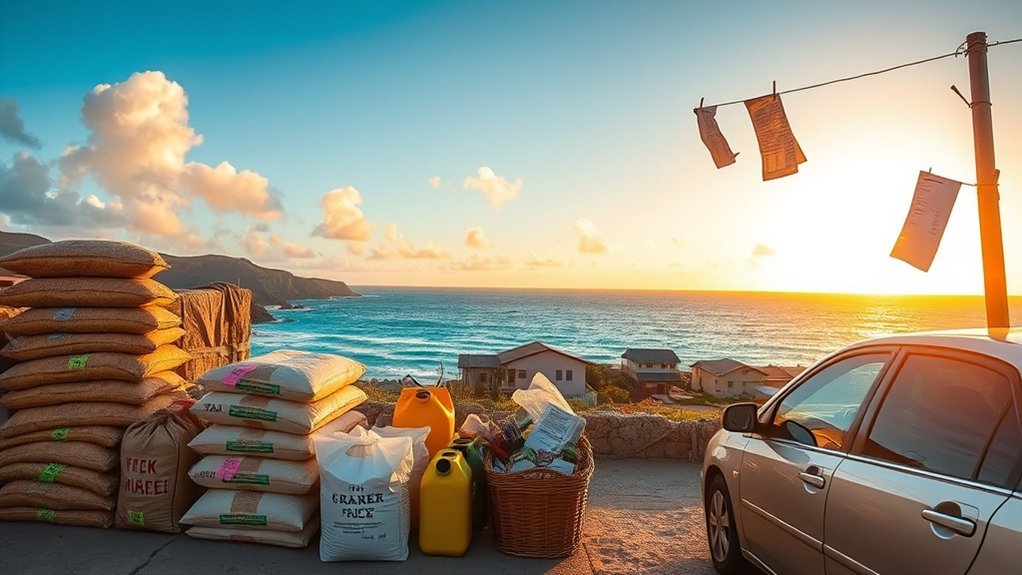
While Nauru’s overall cost of living sits at about $733—roughly 1.56 times lower than the world average—you’ll find wide variation across categories: rent is a major driver (a one‑bed in the city center averages $349 versus $246 outside), basic utilities are modest (~$44/month), and connectivity is inexpensive (50 Mbps ≈ $20.30/month); eating out remains affordable (lunch ≈ $6.77, dinner for two ≈ $30.30).
However, the mean monthly after‑tax salary of $694 only covers roughly 0.9 months of these expenses, signaling limited local purchasing power despite generally lower prices.
A mean after-tax salary of $694 covers only about 0.9 months of typical expenses, revealing weak local purchasing power.
You’ll note the Cost of Living looks less expensive at first glance, but comparative math tells a different story: wages don’t scale with prices.
For planning, treat advertised costs as starting points and build a buffer. If you’re evaluating relocation or budgeting advice, help us prioritize essentials versus discretionary spending to quantify real affordability and identify where small adjustments yield the biggest relief.
Housing, Utilities, and Internet Prices in Nauru
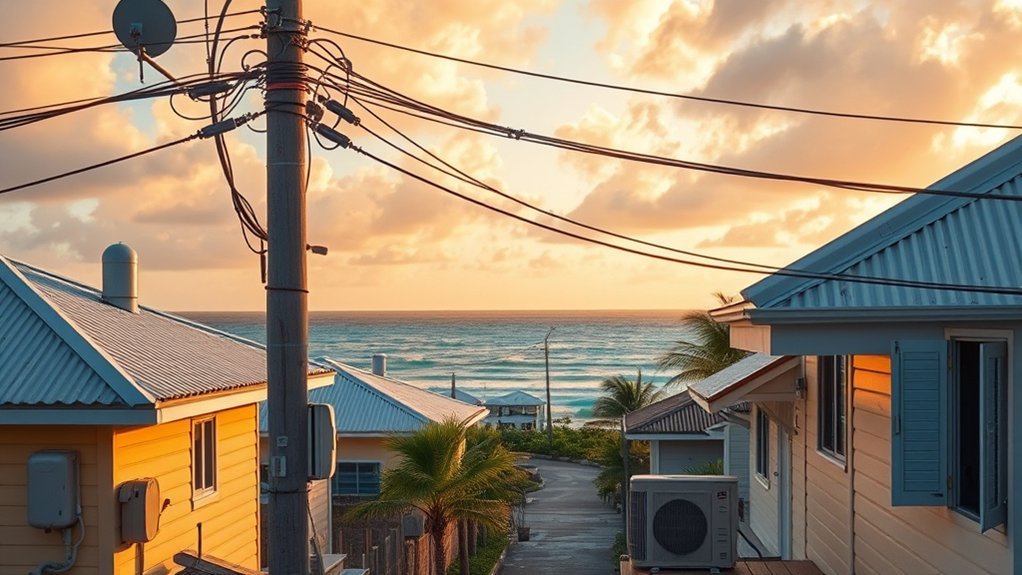
You’ll find 1‑bedroom city-center rents around $349 and cheaper options near $246, while a 3‑bedroom in the center runs about $674, so compare unit size and location when budgeting.
Expect utilities of roughly $44 per person monthly, which is modest compared with many Pacific islands.
Internet varies: basic high‑speed plans (50 Mbps+) can be as low as $20.30 but cable/DSL options often cost about $68.97, so check providers for speed-to-price value.
Apartment Rent Levels
Housing in Nauru is especially affordable: a 1‑bedroom city‑center apartment goes for about $349/month (cheaper options near $246), a 3‑bedroom in the center runs around $674/month, utilities for one person average $44/month, and 50+ Mbps internet costs roughly $20.30/month—putting Nauru’s housing and utility costs among the lower tiers globally (cost of living rank 140/197).
When you compare rent levels, expect modest inventory and small market fluctuations; central units command a clear premium over cheaper alternatives.
If you need more space, the 3‑bedroom premium is roughly double a low-end 1‑bedroom.
Search effort, lease terms, and relocation timing affect price you pay. Review Terms of Use on local listing platforms before committing.
Utilities and Internet
After comparing rent tiers, look next at what utilities and internet add to your monthly housing cost. You’ll typically pay about $44/month for essential utilities (electricity, water). Combine that with internet at roughly $20.30/month for 50 Mbps+, and your extra monthly housing overhead is approximately $64.30.
| Item | Typical Monthly Cost |
|---|---|
| Utilities (per person) | $44.00 |
| Internet (50 Mbps+) | $20.30 |
| 1-bed (city center) | $349.00 |
| 3-bed (city center) | $674.00 |
Compared with many countries, Nauru’s utilities and internet are low relative to rent. If you pick a cheaper 1‑bed outside center ($246), your total housing-plus-essentials drops noticeably, reinforcing the island’s overall affordability.
Food, Groceries, and Dining Out Costs

Although food on Nauru can feel affordable compared with larger Pacific islands, your everyday meals and groceries show a mixed picture: a typical lunch runs about $6.77 while a fast-food combo is $11.12 and a dinner for two averages $30.30.
You’ll find eating out relatively reasonable for quick meals; fast-food combos sit above simple lunches but below many tourist destinations. Drinks are inexpensive: a 0.5L local beer is about $2.15 and a cappuccino around $2.80, letting you grab beverages without a big hit to your budget.
Grocery basics vary: milk (1L) is $1.50, bread (0.5kg) $1.37, a larger loaf $3.56, eggs (dozen) $4.27, and local cheese (8 oz) $6.50.
Compared to imported-heavy Pacific markets, staples here can be competitive, while processed and branded items push prices up. You can control costs by choosing local products and casual dining over imports and upscale restaurants.
Transportation, Fuel, and Local Travel Expenses
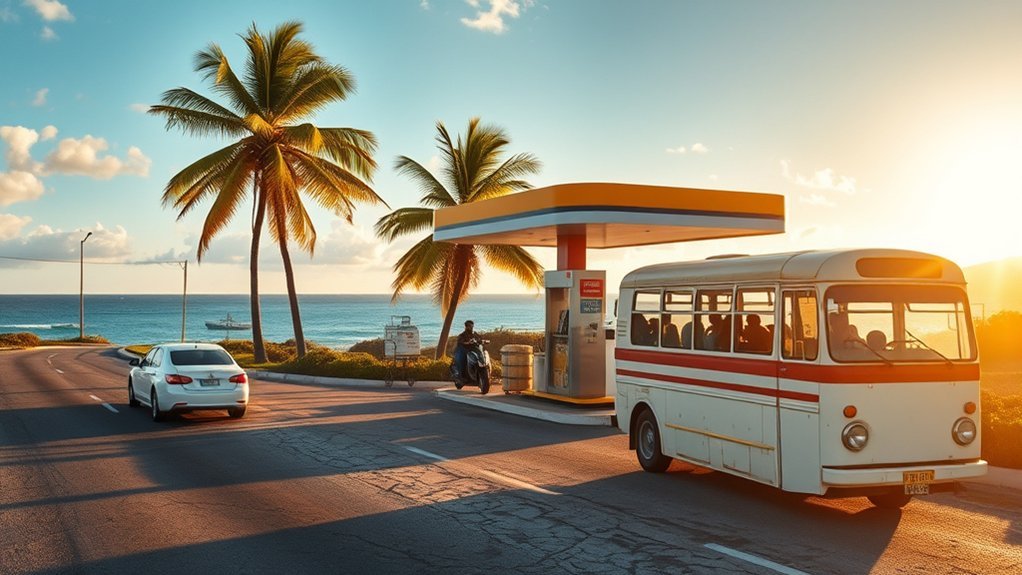
If you plan to get around Nauru, expect limited public transit and relatively low fuel costs to shape your choices: a single local transport ticket runs about $0.63 and a monthly pass is roughly $22.80, but most residents rely on personal cars since buses are sparse. You’ll weigh convenience against cost: a taxi for an 8 km ride is about $9.54, while a downtown 5-mile trip is roughly $17.61, so short shared rides can beat private taxis. Gasoline at ~$1.01 per liter keeps driving affordable, reducing total monthly transport spending if you own a fuel-efficient car.
| Option | Typical Cost |
|---|---|
| Single bus ticket | $0.63 |
| Monthly pass | $22.80 |
| Taxi (8 km) | $9.54 |
Compare: public transit minimizes expenses; taxis offer flexibility at moderate cost; owning a car gives control and lower per-km cost due to cheap fuel, but entails maintenance and insurance.
Healthcare, Education, and Family-Related Costs
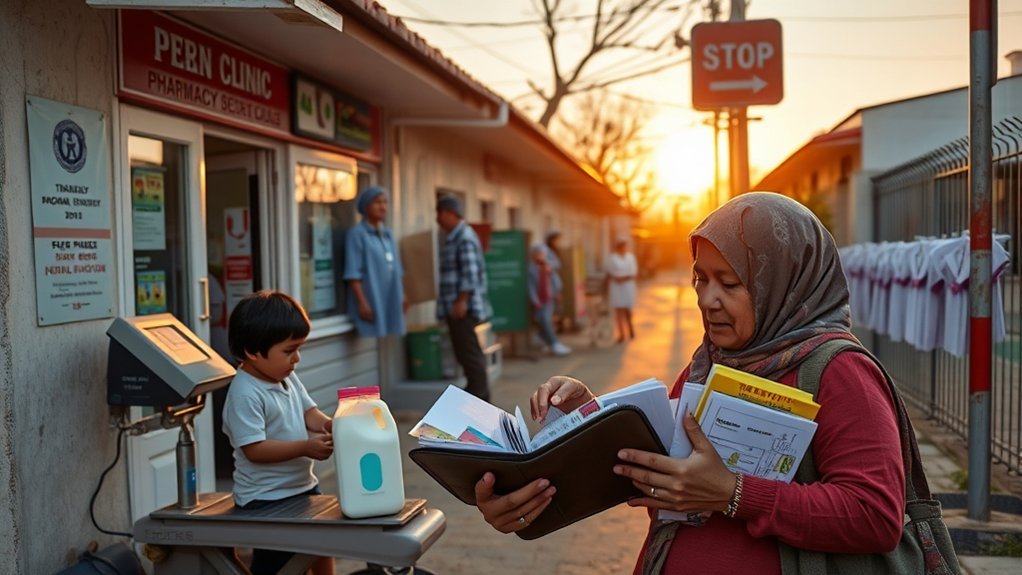
While routine care on Nauru is available at modest cost, you’ll likely need extensive private health insurance because emergency services, specialist treatment, and many medications are limited or absent.
Routine care in Nauru is affordable, but private insurance is essential — emergency, specialist, and many medicines are limited.
Expect to pay for off-island referrals and medevac costs more often than in larger countries; insurance premiums will reflect that risk. Childcare and education push costs higher than routine living expenses.
- Healthcare: public clinics cover basics; private or overseas care and medications drive most family medical spending.
- Early education: private preschool costs about $1,387.27/month per child, considerably above local average incomes and comparable to small-country private rates.
- Schooling options: four infant schools, three primary (including a Catholic option), two secondary schools and one special-needs school exist, but many families send children abroad for broader curricula and qualifications, adding travel and boarding expenses.
You’ll need to budget for higher-than-expected education and potential overseas healthcare when comparing Nauru to regional peers.
Tips to Save Money and Prepare for Unexpected Expenses
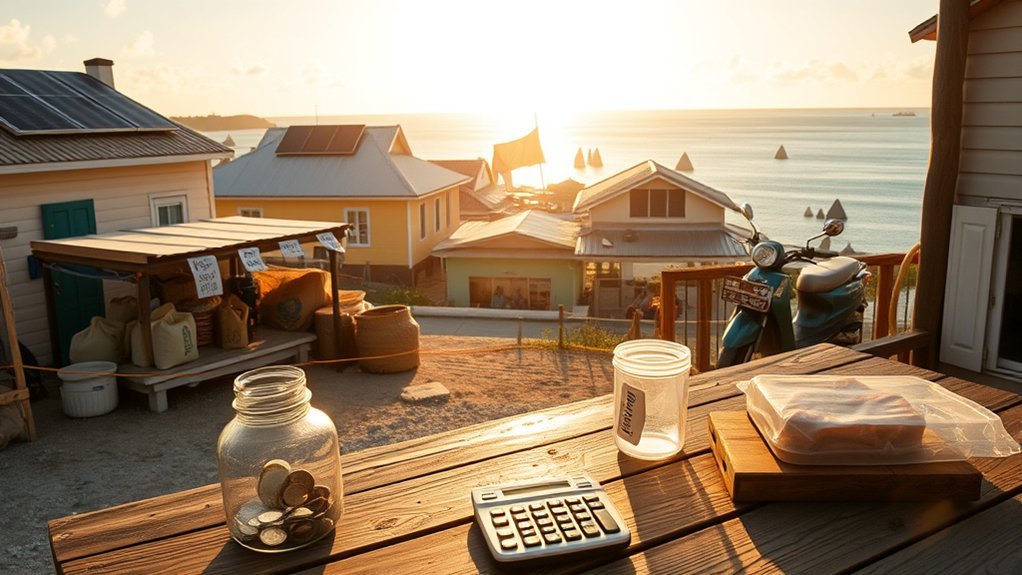
Given higher-than-expected education and off-island healthcare costs, you’ll want practical ways to trim day-to-day spending and buffer against medical evacuations.
Choose lunch menus at about $6.77 instead of dinner-for-two options near $30.30 to cut food costs by roughly 78% per meal instance. Use local transport with a $22.80 monthly ticket rather than frequent taxis that can be $9.54 for an 8 km ride; if you take taxis twice weekly, the monthly saving is substantial.
Seek a 1-bedroom outside the city center (~$246) versus $349 downtown to lower rent by ~29%. Keep utilities around the $44 monthly average through energy-efficient habits — LED bulbs, timed showers, and unplugging devices.
Critically, buy extensive medical insurance: local facilities may not cover emergencies and evacuation is recommended. Allocate an emergency fund equal to 3–6 months of living expenses and confirm your policy covers evacuation and off-island treatments to avoid catastrophic out-of-pocket costs.
Frequently Asked Questions
How Much Does a House Cost in Nauru?
A house in Nauru typically ranges from about $246 to $674 monthly for rented apartments; you’ll pay roughly $349 for a 1‑bed central, $246 for cheaper, $674 for a 3‑bed central, plus utilities and internet.
Is Nauru a Good Place to Live?
Like a small island test case, you’re getting mixed prospects: affordable overall living ($733/month) but wages cover ~0.9 months, life expectancy is low, healthcare concerns exist, English is common, and quality of life ranks moderately high.
How Much Does It Cost to Become a Citizen of Nauru?
You generally can’t buy Nauruan citizenship; you’ll need birth, descent, or ten years’ naturalization. Costs are indirect—legal fees, relocation, living expenses—and vary widely, so budget comparably higher than nearby Pacific nations.
Do They Speak English in Nauru?
Yes — you’ll find English widely spoken in Nauru; about 96.7% can use it, so you’ll communicate easily for government, education, business and daily life, making interactions smoother compared with many Pacific islands.
Conclusion
You’ll find Nauru surprisingly affordable in basics but expensive in choice: rent and local food stay reasonable, while imported goods, healthcare gaps, and sparse flights push costs up. Compare it to nearby Pacific islands and you’ll see lower daily living expenses yet higher unpredictability — steady utility bills versus sudden medical or shipping fees. Plan a modest budget, expect occasional big spikes, and keep an emergency fund so limited comforts won’t become costly crises.


